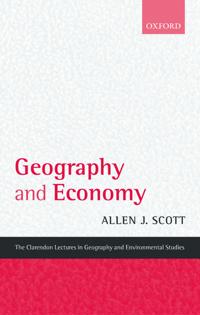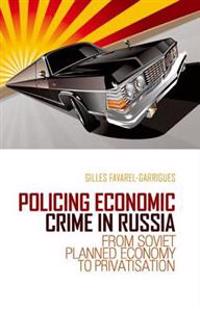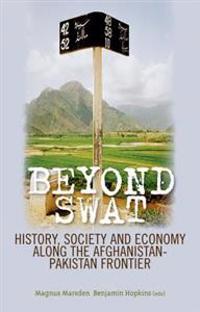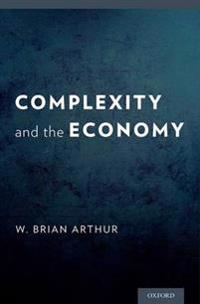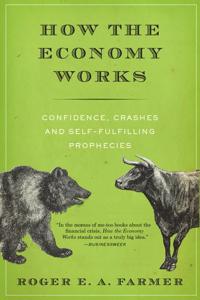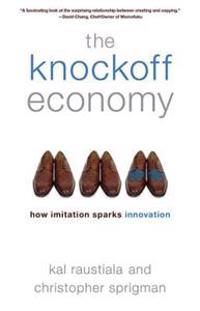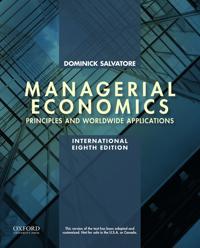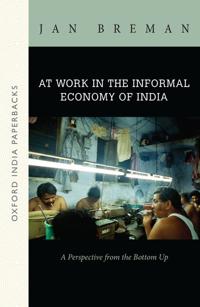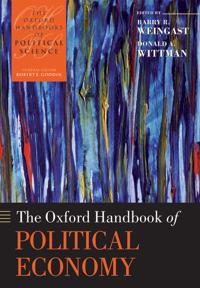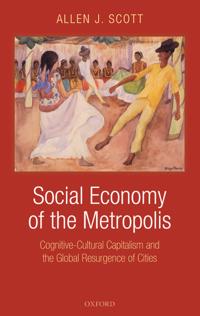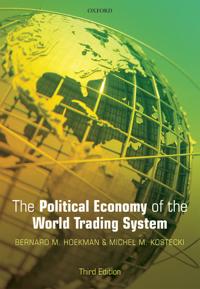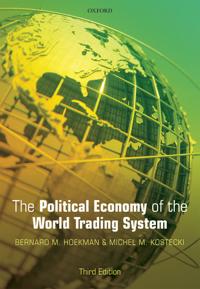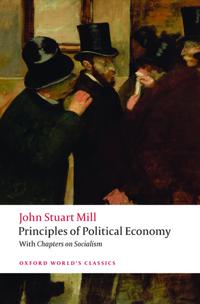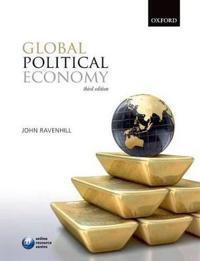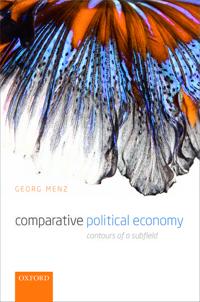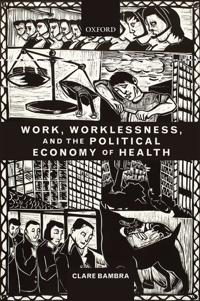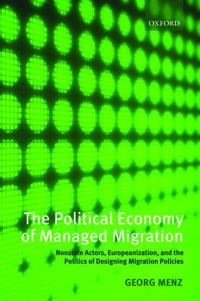The Japanese Economy (Inbunden)
avDavid Flath
ISBN: 9780199278619 - UTGIVEN: 2005-06Despite recent upheavals, Japan remains one of the dominant economic powers. Yet the Japanese economy is one of the most misunderstood phenomena in the modern world. Conventionally, Japan is presented as the exception to mainstream economic theory: an exception to the standard models of modern econo[...]
Twenty-First Century India: Population, Economy, Human Development, and the Environment (Pocket)
avTim Dyson, Robert Cassen, Leela Visaria
ISBN: 9780199283828 - UTGIVEN: 2005-05-05Geography And Economy (Inbunden)
avAllen John Scott
ISBN: 9780199284306 - UTGIVEN: 2006-03This book focuses on the theme of the mutually constitutive relations between geographic space and the economic order. Three principle lines of investigation are identified and explored. First, Allen J. Scott sketches out the general theory of the division of labour and the ways in which it is refle[...]
New Old Economy, The: Networks, Institutions, and the Organizational Transformation of American Manufacturing (Inbunden)
avJosh Whitford
ISBN: 9780199286010 - UTGIVEN: 2005-11-03Economy of Esteem, The: An Essay on Civil and Political Society (Pocket)
avGeoffrey Brennan, Philip Pettit
ISBN: 9780199289813 - UTGIVEN: 2005-12-15Policing Economic Crime in Russia: From Soviet Planned Economy to Capitalism
ISBN: 9780199327317 - UTGIVEN: 2011-01In analysing how economic crime was managed in Russia, from the Brezhnev era to the Yeltsin years, this book reveals the historical roots of the "criminal problem" that has marked Russian politics since the late 1980s. During the closing decades of the Soviet regime, the daily struggle against short[...]
Beyond Swat: History, Society and Economy Along the Afghanistan-Pakistan Frontier
ISBN: 9780199327775 - UTGIVEN: 2012-12Written by anthropologists and historians with long-standing research experience in Afghanistan and Pakistan, as well as expertise in one or more of the region's languages, each chapter explores varying yet interconnected dimensions of the region's culture, society and politics over a broad span of [...]
Complexity and the Economy (Inbunden)
avW. Brian Arthur
ISBN: 9780199334292 - UTGIVEN: 2014-10Economics is changing. In the last few years it has generated a number of new approaches. One of the most promising - complexity economics - was pioneered in the 1980s and 1990s by a small team at the Santa Fe Institute. Economist and complexity theorist W. Brian Arthur led that team, and in this bo[...]
How the Economy Works (Pocket)
avRoger E. A. Farmer
ISBN: 9780199360307 - UTGIVEN: 2014-04"Of all the economic bubbles that have been pricked," the editors of The Economist recently observed, "few have burst more spectacularly than the reputation of economics itself." Indeed, the financial crisis that crested in 2008 destroyed the credibility of the economic thinking that had guided poli[...]
The Knockoff Economy: How Imitation Sparks Innovation (Häftad)
avKal Raustiala, Christopher Sprigman
ISBN: 9780199361090 - UTGIVEN: 2015-04From the shopping mall to the corner bistro, knockoffs are everywhere in today's marketplace. Conventional wisdom holds that copying kills creativity, and that laws that protect against copies are essential to innovation--and economic success. But are copyrights and patents always necessary? In The [...]
Language Policy and Political Economy (Inbunden)
avThomas (EDT) Ricento
ISBN: 9780199363391 - UTGIVEN: 2015-02English is the common denominator that unites the work presented in this volume; it provides a focal point to illustrate the ways in which a political economic approach can account for a range of phenomena in diverse settings in which a "global" language has attained a special status as (an often pe[...]
Consumer Credit and the American Economy
av,
ISBN: 9780199384952 - UTGIVEN: 2015-06Consumer Credit and the American Economy examines the economics, behavioral science, sociology, history, institutions, law, and regulation of consumer credit in the United States. After discussing the origins and various kinds of consumer credit available in todays marketplace, this book reviews a[...]
Managerial Economics in a Global Economy
ISBN: 9780199397150 - UTGIVEN: 2015-01Tastes, production, labor markets, financial markets, and competition have become highly globalized; financial and economic crises have become more frequent, and the risks of doing business have increased in a world economy that has become more sluggish (growing less rapidly than in past decades). T[...]
At Work in the Informal Economy of India (häftad)
ISBN: 9780199467716 - UTGIVEN: 2016-08With labour being pushed out of agriculture, Jan Breman analyses why, when, and how the massive shift in production and employment came about. The book is divided into two parts. The first part discusses the past and present path of capitalism and dwells on the abominable condition of the unorganize[...]
Political Economy of Managed Migration, The: Nonstate Actors, Europeanization, and the Politics of Designing Migration Policies (Inbunden)
avGeorg Menz
ISBN: 9780199533886 - UTGIVEN: 2008-12-18Discourse on Political Economy and the Social Contract (Pocket)
avJean-Jacques Rousseau, Christopher Betts, Jean-Jacques Rousseau
ISBN: 9780199538966 - UTGIVEN: 200902ABOUT THE SERIES: For over 100 years Oxford World's Classics has made available the widest range of literature from around the globe. Each affordable volume reflects Oxford's commitment to scholarship, providing the most accurate text plus a wealth of other valuable features, including expert introd[...]
The Oxford Handbook of Political Economy (Häftad)
avBarry R. Weingast, Donald Wittman
ISBN: 9780199548477 - UTGIVEN: 200806Over its long lifetime, "political economy" has had many different meanings: the science of managing the resources of a nation so as to provide wealth to its inhabitants for Adam Smith; the study of how the ownership of the means of production influenced historical processes for Marx; the study of t[...]
Social Economy of the Metropolis (Inbunden)
avAllen J. Scott
ISBN: 9780199549306 - UTGIVEN: 2008-11This book is about the renaissance of cities in the twenty first century and their increasing role as centers of creative economic activity. It attempts to put some conceptual and descriptive order around issues of urbanization in the contemporary world, emphasizing the idea of the social economy of[...]
The Political Economy of the World Trading System
ISBN: 9780199553761 - UTGIVEN: 2010-01The Political Economy of the World Trading System is a comprehensive textbook account of the economics, institutional mechanics and politics of the world trading system. This third edition has been expanded and updated to cover developments in the World Trade Organisation (WTO) since its formation, [...]
The Political Economy of the World Trading System (Häftad)
avBernard M. Hoekman, Michel M. Kostecki
ISBN: 9780199553778 - UTGIVEN: 200910The Political Economy of the World Trading System is a comprehensive textbook account of the economics, institutional mechanics and politics of the world trading system. This third edition has been expanded and updated to cover developments in the World Trade Organisation (WTO) since its formation, [...]
Principles of Political Economy (Pocket)
avJohn Stuart Mill, Jonathan Riley, John Stuart Mill
ISBN: 9780199553914 - UTGIVEN: 200810This volume unites, for the first time, Books IV and V of Mill's great treatise on political economy with his fragmentary chapters on socialism. It shows him applying his classical economic theory to policy questions of abiding concern, particularly the desirability of sustained growth of national [...]
Global Political Economy (Häftad)
ISBN: 9780199570812 - UTGIVEN: 201101Combining history and theoretical approaches with contemporary issues and debates, Global Political Economy provides an authoritative introduction to this important subject. Expert contributors offer a diverse range of perspectives, as well as engaging insights into the relevance of global political[...]
Comparative Political Economy
ISBN: 9780199579983 - UTGIVEN: 2018-01This new and comprehensive volume covering the subfield of comparative political economy provides a detailed overview over its intellectual roots, clarifies its contents, and introduces the readers to key debates while identifying new and exciting avenues for future research. Ideas, interests, and [...]
Work, Worklessness, and the Political Economy of Health (Häftad)
avClare Bambra
ISBN: 9780199588299 - UTGIVEN: 2011-10We are told that 'work is good for us' and that ill health is caused by 'individual lifestyles'. Drawing on research from public health, social policy, epidemiology, geography and political science, this evidence-based inter-disciplinary book firmly challenges these contemporary orthodoxies. It syst[...]
The Political Economy of Managed Migration
ISBN: 9780199593293 - UTGIVEN: 2011-02European governments have re-discovered labour migration, but are eager to be perceived as controlling unsolicited forms of migration, especially through asylum and family reunion. The emerging paradigm of managed migration combines the construction of more permissive channels for desirable and acti[...]



